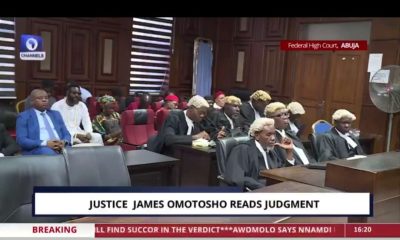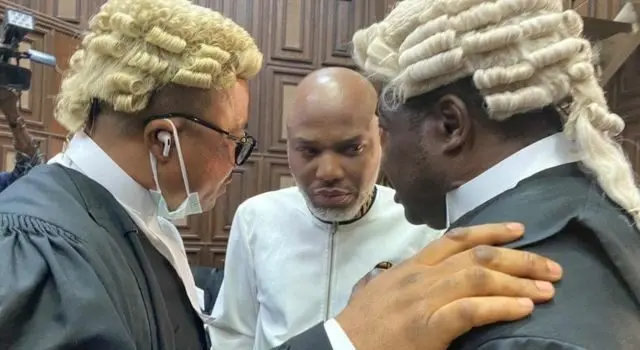Nation
IPOB Rejects Life Sentence for Nnamdi Kanu, Insists Agitation Is Not a Crime

The Indigenous People of Biafra (IPOB) has condemned the Federal High Court in Abuja’s Thursday ruling that sentenced its leader, Nnamdi Kanu, to life imprisonment on seven terrorism-related charges.
In a statement released Friday by its spokesman, Emma Powerful, the group insisted that Kanu “committed no offence known to Nigerian law,” arguing that his activities amounted solely to self-determination – a right they say is protected under international conventions.
Powerful criticised the judgment delivered by Justice James Omotosho, accusing the judge of failing to apply Section 36(12) of the 1999 Constitution, which guarantees that “a person shall not be convicted of a criminal offence unless that offence is defined in a written law.”
“The IPOB wishes to inform the global community, diplomatic missions, international media, and lovers of freedom that we shall, in the coming days and weeks, expose the fundamental defects and illegalities in the recent ruling,” the statement read.
IPOB argued that no weapons, explosives, or attack plans were ever found in Kanu’s possession and that no witness testified to his involvement in any crime. The group maintained that the Federal Government has effectively criminalised self-determination, pointing to protections under the African Charter on Human and Peoples’ Rights and the International Covenant on Civil and Political Rights.
The statement further accused the government of failing to hold security forces accountable for violence against IPOB members during military operations, including the 2016 “Operation Python Dance,” while seeking to punish Kanu as the “victim turned accused.”
Powerful also described the court ruling as unconstitutional, questioning the legal basis of the conviction and alleging that the judge relied on repealed provisions of Nigerian law.
“Justice Omotosho has ignored clear constitutional provisions and binding Court of Appeal and Supreme Court authorities,” the group said, adding that questions surrounding the legal foundation of Kanu’s conviction demand international attention.
IPOB said it plans to release a detailed response in the coming days and will continue to engage international bodies on what it described as judicial and human-rights violations. The group reiterated its demand for a United Nations–supervised referendum in the South-East.
Justice Omotosho, who delivered the ruling in Kanu’s absence, held that the IPOB leader’s broadcasts on Radio Biafra and his directives enforcing sit-at-home orders constituted terrorism. The court also cited Kanu’s alleged involvement in attacks on security personnel by members of the Eastern Security Network as evidence in the prosecution’s case.






